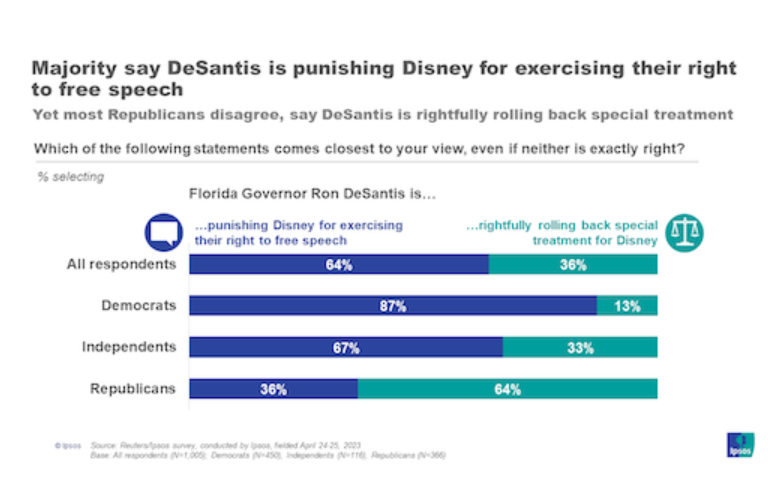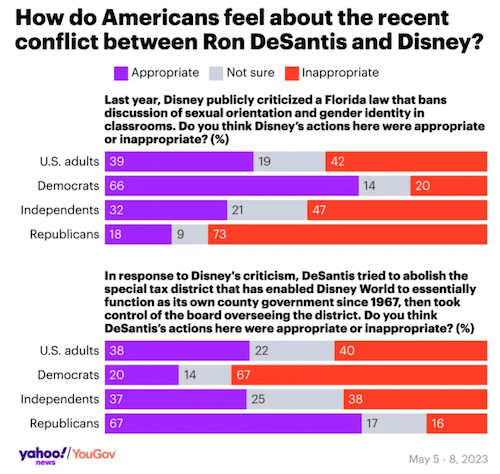All questions in modern Republican politics are ultimately a question of us-and-them. Are you on our side?
Or are you on theirs?
Donald Trump is less to blame for that than internet-driven populism is. Conservative media during the Tea Party era was just as prone to converting all political developments into tribal litmus tests as right-wing media is now. Trump simply steered those litmus tests away from conservative dogma and toward his own cult of personality.
What makes the coming presidential primary intriguing is that it’s the first time in the Trump era that the “us” and “them” positions on an issue won’t always be clear. That’s especially true of Ron DeSantis’ war with Disney, which could hurt the governor badly—or could be just what he needs to do meaningful damage to the frontrunner.
Who’s the “us” and who’s the “them” in that conflict?
I ask because yesterday Disney announced that it’s canceling plans for a new complex in Orlando that had been in the works since 2021. That complex would have brought more than 2,000 high-paying jobs (average salary: $120,000) to Florida and cost around $1 billion in construction. Among the reasons cited by the company for its decision were, ahem, “changing business conditions.”
Dueling theories of what drove the decision emerged after the news broke. For DeSantis critics, “changing business conditions” was an obvious euphemism for the fact that the governor has been running a very public political vendetta against Disney and shows no signs of relenting. His obsession had finally cost the people of Florida real money.
For DeSantis fans, the truth was equally straightforward. Disney had made a bad bet financially on the Orlando complex and was eager to cut its losses. Blaming the governor for the project’s cancellation was blatant bad-faith political opportunism by his enemies on the left and the right.
Which side is correct? Both are, I think.
There’s ample evidence that Disney had soured on the Orlando complex for bottom-line reasons. It had been championed by since-fired CEO Bob Chapek; his replacement, Bob Iger, didn’t see the value of transplanting the company’s Imagineering team from California to Florida at exorbitant cost. The New York Times reports:
As soon as he returned to Disney, Mr. Iger began telling lieutenants, for instance, that it made little sense to move Imagineering so far away from Disney’s movie studios. As he is fond of saying, “Creative teams need to be together.”
Mr. Iger has been systematically reversing Mr. Chapek’s decisions. In February, for instance, he announced that Disney would restructure its inner workings, ending a framework put in place by Mr. Chapek. In March, as part of wide-ranging layoffs, Mr. Iger shut down a 50-person metaverse project that Mr. Chapek had started.
Disney is also in the midst of cutting $5.5 billion in costs as it seeks to improve profitability, pay down debt and restore its dividend. Later on Thursday, for instance, Disney said it would close an underperforming luxury hotel at Disney World.
Disney is tightening its belt, the Orlando project was ill-conceived, the staff in California resented being uprooted, and Iger is keen to put his stamp on operations. Even close observers of the company insist the decision was about business, not politics, a belief echoed by DeSantis’ own staff. Iger may want people to think the governor is to blame as a bit of PR payback for his antics, particularly as he prepares to launch his presidential candidacy, but the truth is more mundane.
I suspect all of that is true, that dollars mattered more to Disney in this case than DeSantis did. But DeSantis fans are embarrassing themselves by insisting that his war on “woke corporations” didn’t matter. The sweaty eagerness and adamance with which they spun yesterday’s news had a doth-protest-too-much vibe to it suggesting that they know better.
Two people told the Times that “the company’s battle with the governor and his allies in the Florida Legislature figured prominently into Disney’s decision to cancel the [Orlando] project.” Mediaite also has sources alleging that DeSantis’ vendetta was “definitely a factor” in the decision and that “the political climate in this state didn’t help.” Iger himself warned not long ago that lingering hostility from Tallahassee would begin to influence his business decisions: “Does the state want us to invest more, employ more and pay more taxes or not?”
A reporter based in Florida noted that paperwork related to the Orlando complex was making its way through city government as recently as March 9, refuting Team DeSantis’ claim that “nothing ever came of the project” after it was announced two years ago.
The governor and his apologists are guilty of a juvenile utopian delusion that I’ve traditionally associated with progressives, the belief that one’s favored policies have no trade-offs. If you abuse the power of the state to persecute a business for expressing disfavored political views, that business will assuredly calculate the risk of future persecution in making financial decisions going forward. It would be irresponsible not to.
Consider: According to the Times, a tax credit under Florida law would have allowed Disney to recoup $570 million of the cost of the Orlando complex over 20 years. If you were Bob Iger, wouldn’t you worry that DeSantis’ next move in your escalating tit-for-tat will be to demand that the legislature render Disney ineligible for that credit?
Imagine sinking $1 billion into a project with the expectation of getting half of it back, only to see that money go up in smoke because the state government now operates according to the governor’s latest vindictive whim.
That’s a drop in the bucket, frankly. Disney is tentatively planning to spend $17 billion on future development in Florida, any or all of which could also be targeted arbitrarily by DeSantis or some like-minded Republican successor. Iger has good reason beyond simple payback to want Floridians to blame the governor for the demise of the Orlando project, in other words. If he doesn’t get DeSantis to back off now by raising the political cost of this vendetta, that $17 billion will remain perpetually at risk. As, of course, will Disney investments in other red states governed by similarly culture-war-minded Republicans who are eager to follow DeSantis’ path to political success.
I’d respect DeSantis’ supporters more if they admitted that they’re willing to sacrifice jobs in Florida to pressure “woke” corporations into keeping their opinions to themselves. That’s an idiotic position but it is a position, one we’d expect from a populist movement neck-deep in culture war. Sticking their fingers in their ears and scoffing at the possibility that businesses—and not just Disney—might now be factoring the governor’s temperament and ephemeral political needs into their long-term development plans is no position at all. It’s a cop out, and a pitiful one.
An ironic one, too. After all, DeSantis was the first party in this fracas to disguise his true motives when he claimed that dissolving Disney’s special improvement district was a matter of accountability and good governance rather than an act of raw political retaliation. All Iger is doing is responding in kind, hiding the many business reasons to cancel the Orlando complex behind the smokescreen that DeSantis must have scared the company away because of a political grudge.
All of which brings us back to the question that’ll matter in the presidential primary. Are you with us on DeSantis versus Disney? Or are you with them?
It’s a trick question, it turns out.
In the Trump era, discerning the “us” position and the “them” position is usually child’s play. “Us” is whatever Trump wants. “Them” is what the RINOs and Democrats want.
Democrats are solidly Team Disney in this case, it won’t surprise you to learn.
Nikki Fried, the head of the Democratic Party in Florida, blasted the governor in a statement yesterday: “DeSantis has single-handedly and decidedly made Florida an anti-business state, not only with his continued attacks on companies that dare challenge his fascist policies, but also by forcing draconian laws that will decimate the workforce of the backbone industries of our state’s economy.”
Democratic legislators from Florida got in on the act too. “Gov DeSantis is more interested in running for president than running the state of Florida,” Rep. Maxwell Frost told CNN, “and now the people of Florida are paying the price.” State Rep. Anna Eskamani called the governor “a job-killing moron who cares more about his own political ambitions and culture wars than Florida and our future. This is not who you want for President—ever.”
If that’s not enough to clarify who “them” is in this case, many all-star RINOs have also condemned DeSantis’ Disney vendetta. There was Mike Pence, the Great Traitor of January 6.
There was establishment hopeful Nikki Haley, all but donning her Mouseketeer cap in an interview last month.
Trump-hater Chris Christie has called DeSantis’ campaign against Disney “anti-conservative” while squishy pro-choice centrist Chris Sununu dismissed it as bad for the Republican Party. Marco Rubio recently pronounced himself worried that the feud was hurting Florida’s economy. Name any figure on the right whom MAGA voters hate and odds are good you’ll find a soundbite or two from them criticizing the governor for squabbling with Mickey Mouse.
Normally watching so many political undesirables coalesce around a position would be enough to cement that position as the “them” view, one any self-respecting populist would shun at all costs. But not this time.
Because Trump’s philosophy of political combat is total war, attacking with any weapon at hand, he and his cronies couldn’t resist using the cancellation of Disney’s Orlando project as a cudgel against DeSantis.
Trump himself promoted a Breitbart story headlined “Disney Nixes Plans for a $1 Billion Complex Bringing Thousands of Jobs to Florida,” and his team issued a long statement touting his own economic record that began this way:
Today, Ron DeSantis single-handedly lost the State of Florida nearly $1 billion in investment and over 2,000 jobs—with an average salary of $120,000—because he was too weak to fight for his state.
Ron DeSantis’ failed war on Disney has done little for his limping shadow campaign, and now is doing even less for Florida’s economy.
On top of that, President Trump warned last month on Truth Social that weakness by DeSantis would lead to today’s disastrous outcome.
For once, he and his team told the truth. Trump did warn on April 18 that DeSantis’ war on “woke” corporations would hurt Florida economically. That outcome was so inevitable that even he couldn’t fail to foresee the unintended consequences.
If Trump’s opinion on Disney and the anti-Trump opinion on Disney are the same, then … which is the “us” position and which is the “them”?
“Trump’s position is the ‘us’ position by definition,” you might say. And that’s correct, if the laws of political gravity that have governed the GOP since 2015 hold. Team Trump will declare that jobs are more important than culture war, that the Disney mess proves DeSantis is out of his depth, and that the governor may have the instincts of a “fighter” but not the skills to actually win.
For eight years, the fanatic nature of Trump’s support has guaranteed that the Republican base will go along whenever he rejects our reality and substitutes his own. (With apologies to Adam Savage.) If DeSantis can’t crack that dynamic, the Republican electorate will do with his war on Disney what it always does with political issues, taking whichever stance best suits Trump’s electoral needs. Overnight, to the governor’s dismay, populist orthodoxy will shift from championing vendettas against “woke” corporations to viewing them as foolhardy misadventures by politicians whose priorities are out of whack.
In a cult, the leader’s opinion is always the “us” position.
What if, though, the populist right’s appetite for culture war has grown so ravenous that the anti-Disney position is necessarily the “us” position, beyond even Trump’s powers to influence?
Recent polling suggests that it is. In late April Ipsos asked Americans whether DeSantis was punishing free speech by coming after Disney or rightfully rolling back special treatment the company has received. Most Americans are in the first camp. Not Republicans.

Earlier this month YouGov posed a pair of similar questions and found the same split.

You don’t need to look hard online to find right-wing outrage toward Disney’s defenders in the GOP, Trump included. RedState’s post last night on the fallout from the Orlando cancellation was titled “Spineless Republicans Beg DeSantis to Surrender to Disney in Pathetic Showing.” Said the author, “It’s starting to feel rather swampy in here, and that includes what’s coming from Donald Trump. I’m pretty sick and tired of being told we need to bend the knee to corporations that spit in our faces because they might cut a few jobs or not donate money to the RNC anymore. … Grooming children isn’t a joke, and if Republicans can’t be counted on to stand up against that, what can they be counted on to do?”
Donald Trump, “groomer” apologist?
This image made the rounds yesterday as well.
Is there space in the primary to Trump’s right with respect to waging culture war?
The premise of DeSantis’ campaign, I argued on Thursday, is that Trump is and was correct on the substance of what the Republican Party should be but that he’s too flawed to win and wield power effectively. Watching Trump reflexively adopt the RINO/Democrat position on a cultural flashpoint as hot as Disney vs. DeSantis has me wondering if there isn’t some room for DeSantis to do real damage on substantive differences after all. Remember, for instance, that CBS poll from a few weeks ago that found “challenging woke ideas” was the most desired trait in a candidate among primary voters?
What if DeSantis goes on offense on that point, highlighting Trump’s squeamishness over the battle with Disney (and his weeks of silence about the Bud Light controversy) as proof that his appetite for culture war no longer matches the base’s—which, by the way, might well be true? What happens if DeSantis’ online fans, many of whom are just as vicious as Trump’s, popularize the “groomer” accusation and end up giving MAGA voters something to think about?
Essential to Trump’s mystique is the belief that he’s the American left’s most fearsome, and feared, antagonist. If he ends up onstage at a primary debate joining the likes of Chris Christie and Nikki Haley in dogpiling on DeSantis for bullying Disney, it’s unclear what that might do to his mystique in the aftermath. Maybe nothing; no one would bet against the cult behaving like a cult at this late date. But if anything’s going to make some wavering populists reconsider, watching Trump run interference for “woke” corporate America will go further than most attacks.
In short, I would not bet everything I own that DeSantis’ Disney vendetta will become a bigger liability for him than it will for Trump. If Republican voters conclude that the “us” position here is inescapably the governor’s position while the “them” position is the former president’s, they may take the logical next step and start wondering which rightly deserves their allegiance.
I’ll leave you with this, a joke on one of Trump’s most demagogic lines yet not really a joke at all. For authoritarians who want to normalize abuses of state power against political enemies, Disney is the beginning, not the end. Insofar as Bob Iger is deterring further abuses by making this episode economically and politically painful for DeSantis, he’s performing a public service.







Please note that we at The Dispatch hold ourselves, our work, and our commenters to a higher standard than other places on the internet. We welcome comments that foster genuine debate or discussion—including comments critical of us or our work—but responses that include ad hominem attacks on fellow Dispatch members or are intended to stoke fear and anger may be moderated.
With your membership, you only have the ability to comment on The Morning Dispatch articles. Consider upgrading to join the conversation everywhere.